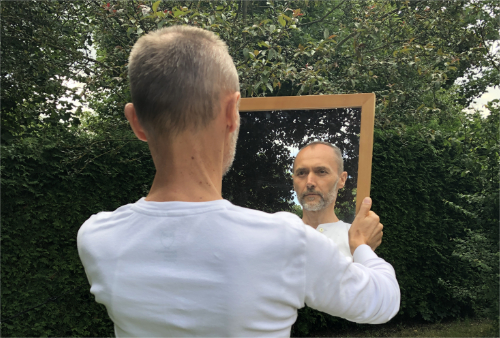
Have you ever wondered how the saying from the Temple of Delphi “Know yourself” could be connected with you? Who is supposed to recognise here and what? Could it be, that if we were to follow this invitation, it could give our life a higher meaning?
Do we need a higher meaning in life at all? And if so, what is the higher meaning? And how do we come to recognise it? And what does this have to do with self-knowledge?
A big step on the way to answering these questions and to self-knowledge is the experience that human reality is a projection of the inner world onto the outer world. The outer world therefore serves as a mirror for self-knowledge. However, people must be prepared to see the world as a mirror. Here is an analogy: When you look in the bathroom mirror and see that your left cheek is dirty, for example, would you think of cleaning the mirror? And suppose you actually had this crazy idea and started cleaning the mirror, do you think it would make your left cheek clean?
The example of the mirror in the bathroom seems clear and logical to us. What we see in the mirror is only an image and not the original. The original is in front of the mirror. In life, however, we find it difficult to see the outside world as a mirror of ourselves. On the path to self-knowledge, however, people cannot avoid looking at themselves in the mirror of their own world.
In this day and age, the phrase from the Sermon on the Mount is still highly relevant:
“Why do you see the grit in your brother’s eye,
but you do not notice the beam in your own eye?”
Because modern man concentrates so much on the outside world, they hardly recognises themself (their own inner world). However, if you take this sentence from the Sermon on the Mount to your heart and apply it to your everyday life, you will experience amazing things.
Man creates everything, including the context of their lives. The outside is created from inside. People experience themselves within themselves.
We are like actors on stage and play out our own theatre piece, which we call “my life“. In our own theatre, we are at the same time both the actor and the director.
It is very important to concentrate on your own life and not constantly be focused on others. The analogy: What would you say to a theatre director who is constantly focussing on other theatre plays and neglecting their own play? What would you say to an actor who learns other actor’s lines but keeps forgetting their own?
Normally, people seek the solution to their own problems (salvation) on the outside. This method works at best and, if at all, then only in the short term. So be mindful when themes and situations repeat themselves in your life, when the actors on your stage change but the play itself always remains the same.
We are everything, the player and the played. There is nothing that is good or bad in itself. It depends on the intention and judgement. Natural aggression, for example, can be an expression of self-love. Imagine if your immune system let everything into your body and did not protect you. Would that be good for you? So the cells of the immune system have to display a certain aggressiveness, otherwise they would not be able to fulfil their task in the body. This is definitely not a call to go through life aggressively. It is a reminder of what is natural in us.
But where can we find the natural in us?
In a creation story I know, God asks his high-ranking angels where on earth he should best hide the greatest treasure from man. One angel suggests: Best on the highest mountain, man will never get there. Another angel suggests hiding the greatest treasure in the depths of the oceans. However, God is not entirely satisfied with either suggestion because he knows that at some point in time man will climb the highest mountain and enter the depths of the seas and oceans. And while God is slowly and desperately searching for a solution, another angel suddenly comes to God and says: “I know where we should hide the treasure from man! We hide it in man themself, in their heart, where they will never search.”
And so it happened and so it is to this days. If a person searches in the outside world, they will find many things and many things will appeal to them. But they will never find the greatest treasure and their search will be frustrating and restless.
Together we get to know ourselves better!
Group seminars at Espirito Dourado can help you to better recognise and understand yourself in the mirror of others. They can also help you to explore the laws of nature and the rules of creation more deeply and to apply them to your daily life in your own way.

About the author Darius Waldhof
Darius is a consciousness researcher, a finder of truth and a impulse giver for a new way of living together. He has the gift of recognising the core message in complex situations and expressing it in a concise form. Darius has a well-developed sense for the hidden and active patterns that operate in interpersonal relationships. In his work, he supports people in their personal, family and professional transformation processes. When it comes to global and social issues, it is of great concern to him to identify the distortions that humanity carries within itself and to point out solutions. Finding one’s own truth, the path of the heart and living together to raise awareness is his vision for the present and future time.




